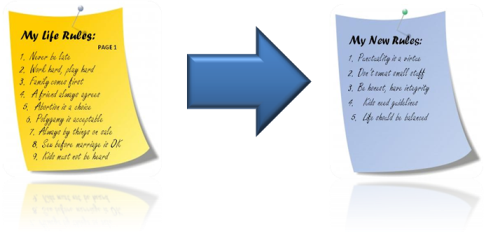Change Your Rules
to Be Happy!
As you have surely realized if you’ve spent any time on this website,
there are many, many ways for us to be happier and more fulfilled in our
lives. There are also many ways for us to limit - or even sabotage -
our ability to BeHappy! One of the ways most of us limit our potential for total happiness is through our rules. We all have them.
Within this BeHappy! “system”, there is one fundamental message I try to convey to everyone – and that’s if you do nothing else, understand
“The 3 R’s” and then use that understanding to make your life better.
The 3 R’s are: Relationships – Rules - and Regrets. And specifically, to BeHappy! in our lives, we must:
- Build and nurture great RELATIONSHIPS
- Minimize and/or change our RULES
- Eliminate REGRETS from our lives
This article (below) is all about the second “R” – RULES
- and how they affect our happiness, both positively and negatively.

For more on the other two “R’s”, (and a lot more on changing your "rules"), get the FREE "Happiness Formula" video course by filling out the information in the boxes to the right and get instant free access.
|
My former business partner, Tony Robbins (the well-known personal
development and life coach) teaches that every disagreement, fight, war,
act of terrorism, or other “upset” between people is due to a
difference in their rules. |
I happen to believe that’s completely
true. Think about it. What do you argue about with your spouse, your
friends, or your family? Why are wars started? What instigates acts of
terrorism?
It’s all about differing rules (based sometimes on opinions between the two or more parties involved).
Whether
it’s about money, the kids, vacations, fidelity, politics, religion, or
anything else – it comes down to a difference in our rules that causes the conflict
Changing Your Rules…
We
all have rules. And the more rules we have, the more likely (and
frequently) others will break our rules - because everyone has different
rules. In addition, the stricter we are about our rules, the stronger
the conflicts we will face when (not if) people break them.
And
changing our rules is not easy. Why? Because our rules are dear to us.
Many times they are fundamental principles we have created for
ourselves, or which were created for us by others, over many, many years
– some since the time we were born – which can be very deep-seeded in
our psychology. Even more difficult is changing other people's rules.
In
relationships, rules can cause significant arguments - even simple
rules. For example, is one of your rules that you must always be on
time for every appointment, event, gathering, party or function? And
what is the rule on this topic of your spouse, significant other, family
members, or closest friends? Is it the same or is it that if you’re
within 30 minutes of the planned time it’s OK? Or do they not even have
a rule related to punctuality? If it’s one of the latter two and your
rule is to be punctual, then you will likely (a) feel stressed every
time you’re late (which is probably often) and/or (b) have an argument
with that person about it.
Do you get the picture? Well, that’s a
very minor “rules upset” (and it’s actually a frequent one for me in my
family). My wife, for example, gets stressed because she knows my rule
about punctuality and I get irritated because my punctuality rule is
frequently violated (especially now that we have a young daughter).
To reduce or eliminate the “upset” associated with this simple example is a three-fold process:
- I must change my rule to a guideline
- I must understand my wife’s rule and she must understand mine
- We must communicate about the difference in rules and she must agree to “meet half-way” toward my new guideline.
Again,
that’s a relatively minor rule example. More significant, though, is
the example of an impactful conversation I had with a very good friend
of mine in Tampa many years ago. At the time, his son was eight years
old and he was discussing how frustrating his relationship was with his
son. He said they were not getting along very well and he may have even
been concerned about the future of their relationship.
After
discussing the details surrounding his frustration and concerns, it was
clear to me that – as always – it was a rules conflict that was creating
most of the problem. So, my advice to him was “simply” that he had to
change his rules a bit (this is one of those “simple” but not
necessarily “easy” things in life).
The bottom line to this
example was that my friend took my advice, and to this day, has
remembered that night because of its impact on his life (he has thanked
me several times over the years for possibly “saving” his relationship
with his son). His son is now 22 years old and he and my friend enjoy a
wonderful relationship together. Sure, they have their disagreements –
as we all do with people we love. And certainly, their rules are not
perfectly aligned (since they rarely are). But just changing some very
strict rules into guidelines has made a very big difference in
their lives. I know my friend, and I'm sure he has coached his son on
this as well – which has also helped a lot.
So, what are your
rules? Do you have lots of them? Are they different from some of the
rules of the people you spend time with?
If you are frequently in arguments with these people, chances are you have too many rigid rules.
So you must either eliminate some of them, or at least change as many of your rules as possible to guidelines. In my book, BeHappy!, there is a series of exercises designed to do just that and improve your life – and your relationships – dramatically.

The bottom line is this:
We
should all evaluate and challenge our rules (as depicted graphically and symbolically above). Are some of them not even
appropriate anymore? Are some of them changeable? Can some be
eliminated altogether?
Then, once this is done, can you discuss this
topic with the people you spend time with regularly (especially those
people who you seem to fight with frequently)? If you can relax,
change, or eliminate some of your rules, then get those people you
relate to regularly to do the same thing, there is no question your life
will improve significantly.
So if by reading this article you
see that your rules are causing conflicts with the people you love and
spend your time with, then make sure to do something about it and I can
promise you will...
BeHappy! my friends
Related articles:
The Relationship Reality Check
(Notes from the Desk of the Neighborhood Shrink)
PLEASE CONSIDER...
If the information on this site helps you and you'd like to make a donation to BeHappy101.com (to help make others happy), please click on the button below to make a contribution. The amount you donate is entirely up to you. A portion will used to contribute to the happiness of others and is greatly appreciated. [WHY DONATE?] |






 I'm Jimmy, the founder and creator of this site and the whole BeHappy! system. My life's purpose is to be a positive, creative force for health and happiness and through this website, my books, coaching, and happiness-building programs, I intend to help as many people as possible live their happiest possible lives.
I'm Jimmy, the founder and creator of this site and the whole BeHappy! system. My life's purpose is to be a positive, creative force for health and happiness and through this website, my books, coaching, and happiness-building programs, I intend to help as many people as possible live their happiest possible lives.